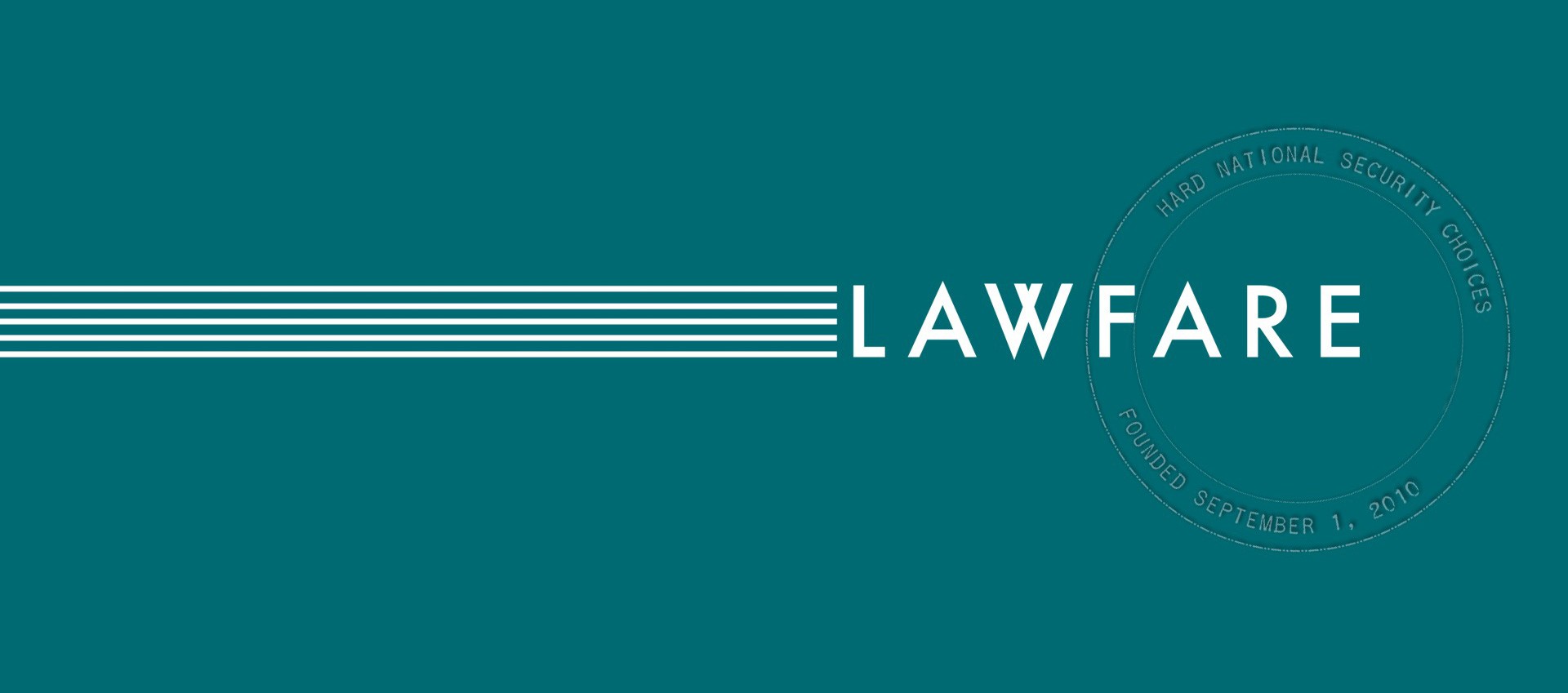The Week That Was: All of Lawfare in One Post
Your weekly summary of everything on the site.

Published by The Lawfare Institute
in Cooperation With

On April 25, the Supreme Court heard oral argument in Trump v. United States, former President Donald Trump’s appeal of the D.C. Circuit decision rejecting Trump’s claim that presidents are immune from criminal prosecutions for acts conducted while in office. Matt Gluck, Hyemin Han, Quinta Jurecic, Natalie Orpett, Roger Parloff, and Alan Z. Rozenshtein analyzed Trump’s and the government’s arguments before the court, what each justice focused on, and what might come next.
Ahead of oral argument in Trump v. United States at the Supreme Court, Jack Goldsmith provided an in-depth analysis of the question of presidential immunity presented in Trump’s immunity appeal and the potential impact of the Court’s eventual decision.
On Lawfare Daily, Orpett sat down with Jurecic, Parloff, and Rozenshtein to discuss oral argument in the case of Trump v. United States, regarding Trump’s claims of “absolute” immunity from criminal prosecution. They discussed Trump’s arguments for why he should be immune from prosecution for his alleged efforts to overturn the 2020 election, the justices’ potential interpretation of this argument, and more:
April 22, 2024 marked the official start of the first criminal trial of a former U.S. president. Wittes explained why Lawfare is covering Trump’s trial in New York and our plans for written, audio, and video coverage.
On April 26, Tyler McBrien sat down with Benjamin Wittes and Anna Bower for “Trump Trials & Tribulations: N.Y. Trial Dispatch, April 26.” If you couldn’t attend, the episode is available on Lawfare’s YouTube Channel or later as a podcast on the Lawfare Podcast feed. You can also watch all previous dispatches here:
Bower, McBrien, and Wittes reported on the first two days of Trump’s New York hush money criminal trial, where Justice Juan Merchan heard opening arguments from the prosecution and defense, testimony from the first witness David Pecker, and more.
Last week, jury selection in Trump’s criminal trial in New York concluded. McBrien reported from the courthouse on the final two days of jury selection and the Sandoval hearing that occurred last Friday afternoon.
Jurecic unpacked Manhattan District Attorney Alvin Bragg’s legal theory supporting his criminal indictment of former President Donald Trump in New York.
On another episode of Lawfare Daily, Wittes sat down with McBrien, Bower, Jurecic, and Parloff for an episode of Trump’s Trials and Tribulations, where they discussed the first few days of Trump’s criminal trial in New York, the legal theory behind Bragg’s indictment, updates in the Mar-a-Lago and Fulton County cases, and more. You can also view it here:
On the Lawfare Podcast, Wittes sat down with Parloff and McBrien to talk about oral arguments at the Supreme Court in Fischer v. United States, which considers an obstruction charge used to charge hundreds of Jan. 6 defendants, and jury selection in the New York criminal case against Trump:
Hunter Evans, Adam George, Jurecic, and Emma Plankey reviewed the ongoing efforts by states across the country to hold the “Trump fake electors” accountable for attempting to flip the Electoral College in favor of Trump.
Katherine Pompilio shared an Arizona grand jury’s indictment of 18 individuals for their alleged involvement in the effort to overturn the results of the 2020 presidential election. Among those indicted reportedly includes Mark Meadows, Rudy Giuliani, John Eastman, and others.
On Rational Security, Rozenshtein, Jurecic, and Scott R. Anderson sat down to talk through the week’s big national security news stories. They discussed the implications the New York criminal trial against Trump on his 2024 presidential campaign, the foreign aid packages finally passed by Congress for Ukraine, Israel, and Taiwan, the regulatory consequences of the new House bill that targets the popular social media platform TikTok and it’s owner, ByteDance, and more:
Rozenshtein considered potential First Amendment challenges to the House’s updated version of a bill requiring TikTok’s Chinese parent company ByteDance to divest from the app or risk getting banned in the United States.
Jurecic and Matt Perault introduced Lawfare’s new page that tracks the legislation proposals to reform Section 230 of the Communications Decency Act. Check out the tracker here.
Ingrid Wuerth Brunk examined the Rebuilding Economic Prosperity and Opportunity for Ukrainians Act (REPO), which allows President Joe Biden to confiscate Russian sovereign assets to support Ukraine. She explained the law’s conditions and limitations on the president’s power, potential constitutional issues, and the international legal implications.
On Chatter, Gluck sat down with David Sanger to discuss his newest book, “New Cold Wars,” in which he argues—relying on a voluminous and colorful set of interviews with administration officials—that the U.S. has entered two new military, technological, and economic conflicts with Russia and China. They discussed how the United States slipped into these conflicts through misreading Chinese and Russian geopolitical intentions, how the U.S. is seeking to navigate this new era, and more:
Newell Highsmith and Toby Dalton argued why nuclear “friend-shoring,” as an alternative solution to increasing the U.S.’s uranium enrichment capabilities in order to decrease its dependence on Russia, would be unprecedented and controversial. They explained how U.S. laws would restrict cooperation with foreign countries and what concerns might arise during congressional review.
In this week’s installment of Lawfare’s Foreign Policy Essay series, Anne Lauder and Hilary Matfess examined the erosion of regional bodies, domestic institutions, and continental norms undermining human security and democratic norms in West Africa, including the exit of counties from ECOWAS and the growth of the Wagner Group.
Maya Nicholson shared the State Department’s 2023 Country Reports on Human Rights Practices, which details the human rights situation in over 200 countries and territories around the world.
On the Lawfare Daily, Goldsmith sat down with Ambassador Robert Lighthizer to discuss his work as the former United States Trade Representative in the Trump administration and the author of the 2023 book, “No Trade Is Free: Changing Course, Taking on China, and Helping America's Workers.” They talked about his role as Deputy U.S. Trade Representative under former President Ronald Reagan, why extreme neoliberal trade policy took hold in the 1990s, the extent to which the Biden administration adopted Lighthizer’s views on free trade, his core philosophy on trade and how it departed from the 1990s neoliberal consensus, and more:
On April 29 at 2:00 p.m. ET, Anderson will moderate a Brookings Institution panel “Domestic Deployment of the National Guard,” with former senior military and defense officials on the increase in non-federal National Guard deployment, what that means for the United States military and the 2024 presidential election, and more.
In the latest installment of the Seriously Risky Business cybersecurity newsletter, Tom Uren discussed Google’s Mandiant unit report on the Russian military intelligence hacking unit Sandworm, the reauthorization of Section 702 of the Foreign Intelligence Surveillance Act, why law enforcement agencies could be better equipped to fight cybercrime, and a new “cybercrime index” that ranks which countries have the most cybercriminals.
Richard Salgado and Robert S. Litt explained how proposed regulations by the U.S. Commerce Department—which requires providers of Infrastructure as a Service (IAAS) to identify and gather information about foreign customers—creates a legal conflict with the Stored Communications Act (SCA), which prohibits the providers from handing over the information the proposed regulation requires.
On Lawfare Daily, Eugenia Lostri spoke to Erica Lonergan about her recent report making the case for establishing a U.S. Cyber Force to address growing cyber challenges, the types of problems the cyber mission faces, and different ways in which they can be addressed:
On Lawfare Daily, Orpett hosted a panel featuring Jonathan Horowitz, Laurie Blank, and Adam Hickey at the annual U.S. Cyber Command Legal Conference, titled “The Business of Battle: Navigating the Role of the Private Sector in Conflict.” They talked about how government and private sector actors bring different frames of reference and different equities when faced with a conflict, how they can work together to address it, and more:
Matthew Tokson, Yonathan Arbel, and Albert Lin argued that both present and future risks of artificial intelligence (AI) can be addressed by meaningful regulation. They explained that laying a regulatory foundation for current harms inevitably confronts potential future issues.
And on April 3, Lawfare announced another auction item on the Givebutter campaign—the “Black Hole of Awful” Post-It by Jurecic, one-of-a-kind Lawfare sketch born from a conversation with Wittes that illustrates the extent to which trial delay is advantageous to Trump. Other items of exclusive Lawfare merchandise up for auction include an autographed Lawfare jigsaw puzzle and Wittes’s Twitter sensation and protector of democracy #BabyCannon. Place your bids to support Lawfare’s Trump Trials coverage. You can also support Lawfare’s Trump Trials coverage by making a contribution here.
And that was the week that was.




